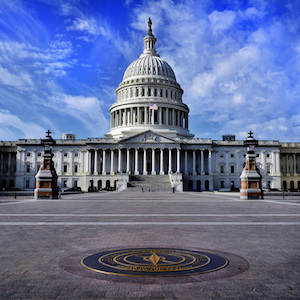 As promised, the Republican-led House of Representatives moved forward with a congressional disapproval resolution against the Department of Labor’s recently finalized environmental, social and governance (ESG) rule.
As promised, the Republican-led House of Representatives moved forward with a congressional disapproval resolution against the Department of Labor’s recently finalized environmental, social and governance (ESG) rule.
On a near party-line vote of 216-204, the House approved H.J. Res. 30 introduced by Rep. Andy Barr (R-KY), which states “That Congress disapproves the rule submitted by the Department of Labor relating to ‘Prudence and Loyalty in Selecting Plan Investments and Exercising Shareholder Rights’ (87 Fed. Reg. 73822 (Dec. 1, 2022)), and such rule shall have no force or effect.” Rep. Jared Golden (D-ME) was the lone Democrat to vote in favor of the resolution, while 13 members did not vote.
The disapproval resolution was put forward using the Congressional Review Act’s expedited procedures that gives Congress the ability to block newly finalized federal rules. Notably, a rule that is disapproved using this procedure is not only nullified, but the respective agency is also prevented from reissuing a “substantially similar” rule unless Congress authorizes it to do so through subsequent legislation.
The final rule, which allows plan fiduciaries to consider climate change and other environmental, social and governance factors when they select retirement investments and exercise shareholder rights, such as proxy voting, was published in the Federal Register on Dec. 1, 2022, and became effective Jan. 30, 2023, except for a delayed applicability date for certain proxy voting provisions.
Senate Consideration?
Of course, the House’s approval of the resolution is not the end of the story. The resolution will also have to be approved by the U.S. Senate, where a companion resolution was introduced by Sen. Mike Braun (R-IN). The Senator from Indiana has noted that he has the backing of every Republican in the Senate, plus Sen. Joe Manchin (D-WV). With Sen. John Fetterman (D-PA) taking a leave of absence from the Senate, it’s possible the Senate could pass the resolution under the current ratio of 51 Democrats to 49 Republicans (note: Independent Sens. Bernie Sanders (I-VT) and Angus King (I-ME) caucus with the Democrats).
A vote in the Senate could come as early as this week, according to a report by Reuters. Still, even if it passes in the Senate, it will draw a veto from President Joe Biden—which would be the first of his Administration.
In a Feb. 27 statement, the Biden administration announced that if H.J. Res. 30 is presented to him, that he would veto it. “To be clear, the 2022 rule is not a mandate—it does not require any fiduciary to make investment decisions based solely on ESG factors. The rule simply makes sure that retirement plan fiduciaries must engage in a risk and return analysis of their investment decisions and recognizes that these factors can be relevant to that analysis.”
The White House further contends that, if the DOL “were to revert to the 2020 rule, the federal government would be interfering with the market in a manner that stands in the way of retirement plan fiduciaries’ ability to protect these hard-earned retirement savings and pensions and unnecessarily limit the options available to retirement plan participants and investors.”
Meanwhile, the politically charged dynamics of the ESG rule do not appear to be settling down anytime soon. Sen. Tina Smith (D-MN) recently reintroduced legislation — the Freedom to Invest in a Sustainable Future Act (S. 523) — to provide “legal certain ty” to plan sponsors and fiduciaries who wish to consider ESG factors in selecting investment options in retirement plan menus.
The DOL’s new rule is also the subject of two legal challenges, including a suit brought in late January by a coalition of 25 State Attorneys General (along with a plan sponsor and an unrelated plan participant) before the U.S. District Court for the Northern District of Texas, along with a suit filed by DC plan participants in late February before the U.S. District Court for the Eastern District of Wisconsin.
Both suits make similar arguments, contending, among other things, that the ESG rule violates the Administrative Procedure Act and ERISA, and is arbitrary and capricious. The State Attorneys General have also taken their suit one step further by filing a motion for preliminary injunction on Feb. 21, arguing that plaintiffs will suffer “irreparable harm” without an injunction.
- Log in to post comments
